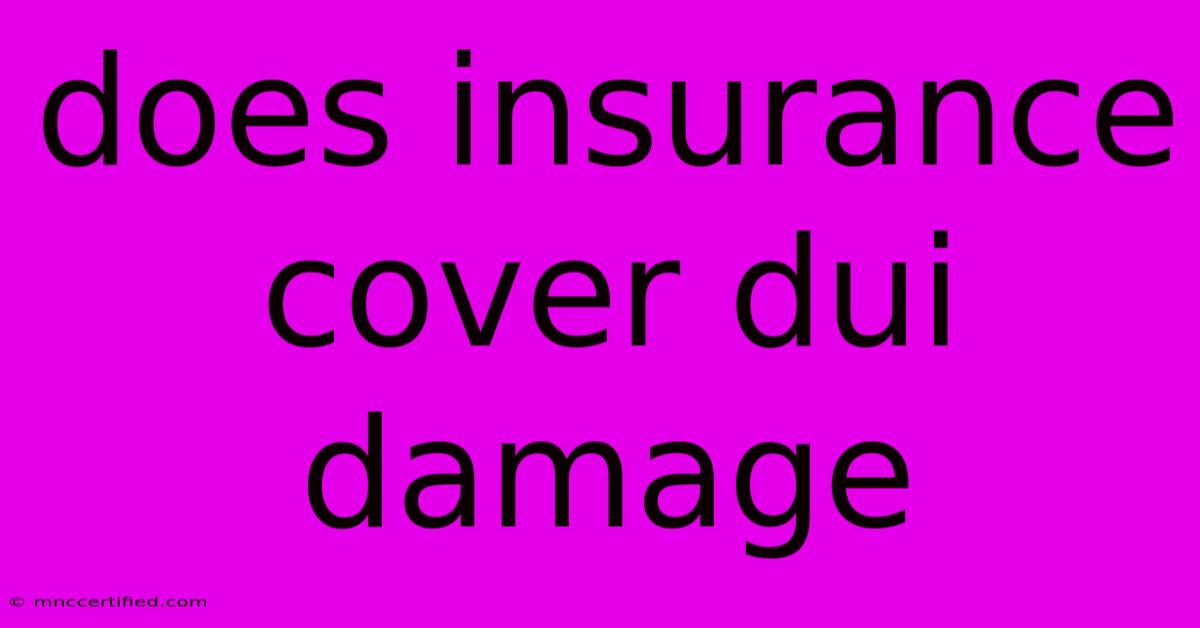Does Insurance Cover Dui Damage

Table of Contents
Does Insurance Cover DUI Damage? A Comprehensive Guide
Driving Under the Influence (DUI) significantly impacts your car insurance coverage. While your insurance might cover some damages resulting from a DUI accident, it's far from guaranteed, and the process is significantly more complex than a standard accident claim. This article will clarify what you can expect and what to do if you're involved in a DUI accident.
Understanding Your Insurance Policy
Before diving into the specifics of DUI and insurance, it's crucial to understand your policy. Most policies include liability coverage, collision coverage, and comprehensive coverage.
-
Liability Coverage: This covers injuries or damages you cause to other people or their property. Even with liability coverage, a DUI significantly complicates the claim. Insurance companies often deny or severely restrict payouts if alcohol or drugs were a contributing factor. They may argue you were negligent, and therefore, not entitled to full coverage.
-
Collision Coverage: This covers damages to your vehicle, regardless of fault. However, with a DUI, your insurer might still deny your claim or significantly reduce the payout. They'll likely investigate thoroughly to determine the extent of your responsibility. Expect higher deductibles and potential policy cancellations.
-
Comprehensive Coverage: This covers damages to your vehicle from non-collision events, such as theft, vandalism, or weather-related damage. A DUI usually doesn't directly affect this coverage unless the damages were caused as a direct result of the DUI (e.g., your car was damaged while you were intoxicated and parked illegally).
Factors Affecting Insurance Coverage After a DUI
Several factors influence whether your insurance covers damages after a DUI:
-
Your State's Laws: State laws vary regarding DUI and insurance. Some states have stricter regulations than others, and some mandate higher penalties for drivers with DUI convictions. Research your state's specific laws concerning DUI and insurance.
-
Your Policy's Specific Terms: Carefully review your policy documents. Look for clauses related to alcohol or drug use while driving. These clauses often outline limitations on coverage in such scenarios.
-
The Severity of the Accident: A minor fender bender is treated differently than a serious accident with multiple injuries. The more severe the accident, the more likely your insurance company will scrutinize your claim.
-
Your Driving Record: Prior driving infractions, particularly previous DUIs, will significantly increase the likelihood of claim denial or reduced coverage.
-
The Police Report: The police report will play a crucial role in the insurance company's investigation. It serves as official documentation of the events, including the determination of fault.
What to Do After a DUI Accident
If you're involved in an accident after a DUI, take these steps:
- Ensure Safety: Call emergency services immediately if anyone is injured.
- Call the Police: Cooperate fully with law enforcement and don't admit fault.
- Contact Your Insurance Company: Report the accident promptly, even if you believe your coverage won't apply.
- Gather Information: Collect contact information from witnesses and other drivers involved. Take photos of the damage to all vehicles involved.
- Seek Legal Counsel: A DUI accident can have serious legal and financial consequences. A lawyer specializing in DUI defense and personal injury can help protect your rights.
Consequences Beyond Insurance Claims
Beyond the insurance implications, a DUI can lead to:
- License Suspension or Revocation: Depending on the severity of the offense and your state's laws, you could face license suspension or revocation.
- Fines and Court Costs: Expect substantial fines and court costs associated with the DUI charge.
- Increased Insurance Premiums: Even if your insurance covers some damages, expect your premiums to skyrocket for years to come.
- Jail Time: In some cases, DUI can lead to jail time.
In conclusion, while your car insurance might offer some coverage after a DUI accident, it's significantly less certain and likely less comprehensive than a standard accident. Understanding your policy, cooperating with authorities, and seeking legal counsel are crucial steps to minimize the repercussions of a DUI-related accident. Remember, the safest course of action is always to avoid driving under the influence.

Thank you for visiting our website wich cover about Does Insurance Cover Dui Damage. We hope the information provided has been useful to you. Feel free to contact us if you have any questions or need further assistance. See you next time and dont miss to bookmark.
Featured Posts
-
Az Small Group Health Insurance
Nov 24, 2024
-
U Mass Vs Georgia Live Stream And Tv
Nov 24, 2024
-
Collins Insurance Reidsville Ga
Nov 24, 2024
-
Suspended Match Millwall Vs Sunderland
Nov 24, 2024
-
Insurance Companies Beaumont Tx
Nov 24, 2024